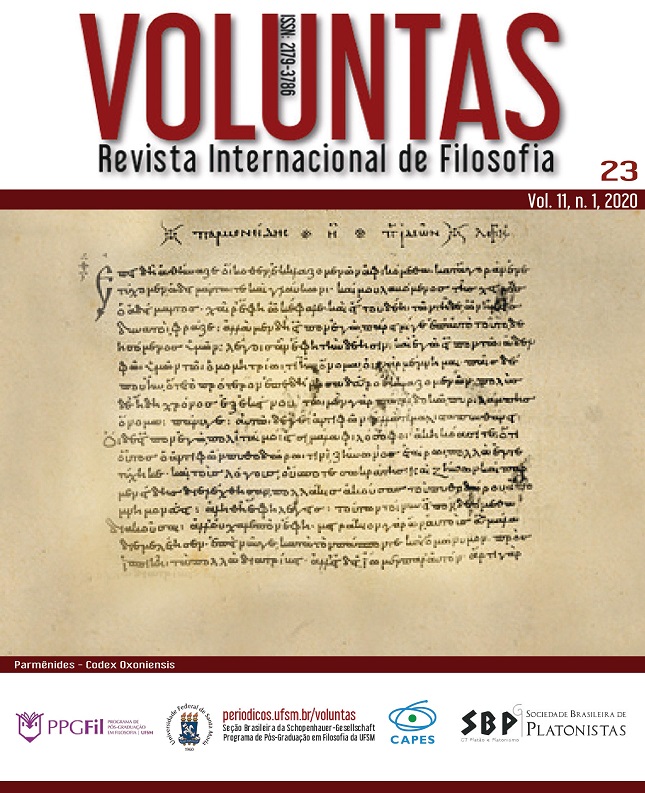Many things or Multiple things? - Two Senses for Zeno’s Paradox in Plato’s "Parmenides"
DOI:
https://doi.org/10.5902/2179378643310Keywords:
Eleatic monism, Numerical pluralism, Attribute pluralism, FormsAbstract
In this paper, I propose an original interpretation for the duplicity of meanings that the pluralistic thesis (πολλά ἐστι τὰ ὄντα) comprises: it can mean a numerical multiplicity, that is: the thesis that there is more than one thing in the world, as well as can mean that the same thing has more than one attribute. Here it is argued that Socrates was aware of this ambiguity, and that these two understandings of pluralism represent complementary perspectives on the same philosophical position. This interpretation allows me to better understand Socrates’ criticism against the Eleatic monism, and his distinction between Forms and immanent properties. Finally, I demonstrate how these two meanings of multiplicity are also part of the strategy used by Parmenides in his counter-argument to the Socratic solution to Zeno’s paradox.
Downloads
References
ALLEN, R. E. Plato’s Parmenides. Translated with comment. New Haven: Yale University Press, 1997.
BRISSON, L. Platon Parmenide: introduction et notes, Paris: GFlamarion, 1990.
BRISSON, L. Platon Parmenide:introduction et notes; 2 editon, GF, Paris, 2011
CORNFORD, F. Plato and Parmenides. London: Keagan Paul: 1951.
CASSERTANO, G. Critica delle idee ed argomentazione dialettica nella prima parte del Parmenide. In: Atti del Convegno di Filosofia Bocca di Magra, 1990.
COXON, A. H. The Philosophy of Forms: An Analytical and Historical Commentary on Plato's Parmenides. Assen: Van Gorcum: 1999.
EL MURR, D. “Les Forms sans L'ame. Parm. 131a-133a: Est-il une critique de la participation?”, Anticorum Philosophia, 4, 2010, p.137-160.
FRONTEROTTA, F. METHEXIS. La Teoria Platonica delle Idee e la Partecipazione delle Cose Empiriche. Pisa: Scuola Normale Superiore, 2001.
GILL, M. L. & RYAN, P. Plato: Parmenides, Indianapolis: Hackett, 1996.
HARTE, V. Plato on Parts and Holes – The Metaphysics of Structure. Oxford: Clarendon Press, 2002.
HEATH, T. A History of Greek Mathematics. Volume I: From Thales to Euclid Volume II: From Aristarchus to Diophantus. Oxford: Clarendon Press, 1960.
IGLÉSIAS, M. A relação entre Sensível e Inteligível: methexis ou mímesis. In: PERINE, M. (ed.) Estudos platônicos: sobre o ser e o aparecer; o belo e o bem. São Paulo: Loyola, 2009. p. 91-112.
IGLÉSIAS, M. & RODRIGUES, F. Platão. Parmênides. Rio de Janeiro/São Paulo: PUC/Loyola, 2003.
MACCABE, M. Unity in Plato’s Parmenides. In: Forms and Arguments in Late Plato. Oxford: Claredon Press, 1996.
MANSFELD, J. Die Vorsokratiker, I: Milesier, Pythagoreer, Xenophanes, Heraklit, Parmenides. Stuttgart: Philipp Reclam Jun, 1986.
MORROW, G. & DILLON, J. Proclus' Commentary on Plato's Parmenides. Princeton, N.J. : Princeton University Press, 1987.
PETERSON, S. Parmenides. In: FINE, G. The Oxford Handbook of Plato. Oxford: Oxford University Press, 2008.
ROSSVAER, V. Laborious Games: Study of Plato’s Parmenides, Universitetsforlaget, 1983.
SAYRE, K. M. Parmenides' Lesson, Notre Dame, University Press, 1996
SCOLNICOV, S. Plato's Parmenides: translated with an introduction and commentary. Berkeley, University of California Press, 2003.
TURNBULL, R. G. The Parmenides and Plato's Late Ontology, Toronto, University of Toronto Press, 1998
Published
How to Cite
Issue
Section
License
The submission of original manuscripts to this journal implies the transference, by the authors, of the copyrights for printed and digital publication. The copyrights of a published manuscript belong ultimately to the author, and only the copyright for its first publication is reserved to the journal. Authors may only use the same results in other publications explicitly indicating this journal as the medium of the original publication.
Licence
Attribution-NonCommercial-ShareAlike 4.0 International (CC BY-NC-SA 4.0) - This license lets others remix, tweak, and build upon your work non-commercially, as long as they credit you and license their new creations under the identical terms.






